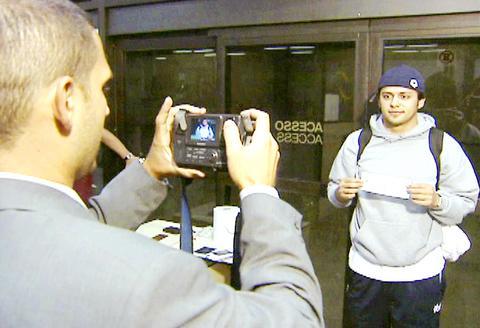Brazil said Friday it would not end court-ordered photographing and fingerprinting of US visitors, a tit-for-tat response to a similar US measure, despite grumbling over the US action.
"I consider the act itself absolutely brutal, an attack on human rights, a violation of human dignity, xenophobic and as bad as the worst horrors sponsored by the Nazis," Judge Julier Sebastiao wrote of the US measures, in his decision ordering Brazilian authorities to fingerprint and photograph all US visitors.
Brazil's policy is to treat foreign visitors as their countries treat Brazilians.

PHOTO: REUTERS
Beginning Jan. 5, US immigration officials at all international airports will vet visitors' passports and visas and pose the usual questions -- before taking their photographs and inkless digital fingerprints.
Visitors from 27 countries whose citizens may enter the US without a visa are exempt from this "biometric identification." The list of 27 is made up mostly of European countries and does not include Brazil.
A Brazilian foreign ministry spokesman told reporters Friday that the government could appeal the court order, but "never considered it."
Brazilian police photographed and fingerprinted US citizens arriving at Sao Paulo international airport. Police in Rio de Janeiro told the Brazilian news agency, Agencia Brasil, that they had not received official instructions, but would begin the procedure today.
Biometric identification was taken from about 230 US citizens, many of whom made clear displeasure, according to police.
The US said Friday that it was Brazil's right to impose such requirements, but deputy US State Department spokesman Adam Ereli said in Washington, "Our consulates general in Sao Paulo and Rio de Janeiro are monitoring developments on this issue closely."
Ereli said the US had no plans to complain or even discuss the regulations with Brazilian authorities as "countries have the sovereign right to determine the entry requirements for foreign nationals who apply for admission to their individual country."
"This is their sovereign right to do if they want to do it," he told reporters.
Rio's mayor, Cesar Maia, protested the Brazilian counter-measures, saying, "It makes us an international laughing stock ... when Rio has just gotten some international visibility hosting large sporting and tourist events."
"Brazil wants to be treated on an equal footing on every level and 2004 might give standing to new friction," National University of Brazil political science professor David Fleischer reporters.

‘SWASTICAR’: Tesla CEO Elon Musk’s close association with Donald Trump has prompted opponents to brand him a ‘Nazi’ and resulted in a dramatic drop in sales Demonstrators descended on Tesla Inc dealerships across the US, and in Europe and Canada on Saturday to protest company chief Elon Musk, who has amassed extraordinary power as a top adviser to US President Donald Trump. Waving signs with messages such as “Musk is stealing our money” and “Reclaim our country,” the protests largely took place peacefully following fiery episodes of vandalism on Tesla vehicles, dealerships and other facilities in recent weeks that US officials have denounced as terrorism. Hundreds rallied on Saturday outside the Tesla dealership in Manhattan. Some blasted Musk, the world’s richest man, while others demanded the shuttering of his

TIGHT-LIPPED: UMC said it had no merger plans at the moment, after Nikkei Asia reported that the firm and GlobalFoundries were considering restarting merger talks United Microelectronics Corp (UMC, 聯電), the world’s No. 4 contract chipmaker, yesterday launched a new US$5 billion 12-inch chip factory in Singapore as part of its latest effort to diversify its manufacturing footprint amid growing geopolitical risks. The new factory, adjacent to UMC’s existing Singapore fab in the Pasir Res Wafer Fab Park, is scheduled to enter volume production next year, utilizing mature 22-nanometer and 28-nanometer process technologies, UMC said in a statement. The company plans to invest US$5 billion during the first phase of the new fab, which would have an installed capacity of 30,000 12-inch wafers per month, it said. The

Taiwan’s official purchasing managers’ index (PMI) last month rose 0.2 percentage points to 54.2, in a second consecutive month of expansion, thanks to front-loading demand intended to avoid potential US tariff hikes, the Chung-Hua Institution for Economic Research (CIER, 中華經濟研究院) said yesterday. While short-term demand appeared robust, uncertainties rose due to US President Donald Trump’s unpredictable trade policy, CIER president Lien Hsien-ming (連賢明) told a news conference in Taipei. Taiwan’s economy this year would be characterized by high-level fluctuations and the volatility would be wilder than most expect, Lien said Demand for electronics, particularly semiconductors, continues to benefit from US technology giants’ effort

Minister of Finance Chuang Tsui-yun (莊翠雲) yesterday told lawmakers that she “would not speculate,” but a “response plan” has been prepared in case Taiwan is targeted by US President Donald Trump’s reciprocal tariffs, which are to be announced on Wednesday next week. The Trump administration, including US Secretary of the Treasury Scott Bessent, has said that much of the proposed reciprocal tariffs would focus on the 15 countries that have the highest trade surpluses with the US. Bessent has referred to those countries as the “dirty 15,” but has not named them. Last year, Taiwan’s US$73.9 billion trade surplus with the US